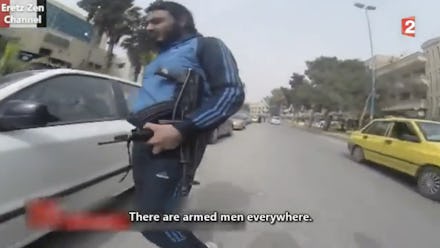Woman's Hidden Camera Shows Us True Life in the Islamic State

What's life like in Islamic State's nascent caliphate? Pretty much a nightmare — especially if you're a woman.
An anonymous Syrian student concealed a hidden camera under her niqab in Raqqa, Syria, the informal "capital" of the Islamic State, as part of a documentary for France 2.
The videos were taken in February and April, well before the current U.S. bombing campaign or Islamic State's rapid expansion from its original stronghold of Syria into Iraq. Raqqa now serves as IS' capital, where the militants reportedly execute as many as five people a week for various violations of the caliphate's new laws. The fighters there are well organized and coordinated, recently surviving U.S. airstrikes relatively unscathed.
Black banners cover the streets, which are patrolled by irregulars clutching automatic rifles and decked out with grenades and body armor.
Islamic State's informal fighters appear to have full jurisdiction to deal with Raqqa's citizens as they desire, or at least bring them to a sharia court.
At one point, a woman covered head to toe can be seen escorting her child to a park while carrying a Kalashnikov (rifle).
In Raqqa, where IS members severely punish citizens displaying insufficient piety, women are forced into modesty.
The woman filming is also accosted by men in a sedan who chastised her for appearing in public: "We see your face ... you have to pay attention for covering up." As she attempts to explain that the exposure was accidental, a man in the car insists with thinly veiled hostility that "God loves women who are covered."
France 2 reports approximately 150 French women in Syria have come to join their husbands as they became foreign fighters or were recruited as Islamist brides. In a women-only basement Internet cafe, they sometimes argue with their families about their refusal to return home.
The full report is below, featuring what small snippets France 2's undercover movie-maker was able to smuggle out of Syria — presumably at great personal risk.
More recent reports confirm that life in Raqqa is unbearable for many. A local using the pseudonym Abu Said told NBC News that "severed heads on fences, and people who are crucified" are not uncommon, while two brigades of armed IS fighters maintain control over each gender.
But he reluctantly admitted that however brutal the regime Raqqa's new rulers have implemented may be, it nonetheless appears to be usurping many of the functions of the government that preceded it:
"With the departments they have established, they really have created a state. ... One cannot deny that, for instance, they opened a consumer protection office. If one has a restaurant and they came to check it out, and the meat was bad, or it was exposed to dirt or sunlight, they would take expired material and dispose of it as a sanitary action. They follow up on these issues completely with the departments they have created."
The costs of this new quasi-state, however, are almost beyond comprehension. In an interview with Mashable, a former doctor at Raqqa National Hospital relayed tales of brutality — including a time when IS guards intervened in an emergency procedure to ensure the female patient's face remained covered.
She died.